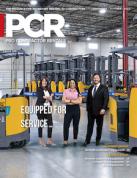So it’s time to sell your rental business
Have the right tools and strategies in place to win top dollar for your business.
by Malcolm Roach
Time marches on for everyone. If you are the owner or founder of an equipment rental business, it is important to prepare well ahead of time for the eventual transfer to new owners if you want to maximize your proceeds.
There are many reasons why you might be ready to move on from your rental business, but one thing is for sure: it won’t be simple.
Why consider a sale
Unfortunately, many businesses are sold after the owners waited too long and lost their health or even their lives. Family and fellow stakeholders may find themselves in an unenviable position.
|
Merger and acquisition trends in equipment rental Several large organizations, such as United Rentals and Sunbelt, are rapidly vacuuming up local equipment rental shops to add to their locations. They are looking for profitable businesses and are not trying to take advantage of the sellers. If sellers play their cards right, they can engage with them as one of several possible buyers when it is time to sell. As with any other buyer, try to determine their motivations for the purchase and what their plans are for your organization. It is perfectly normal for you to want to protect your existing staff, so don’t be afraid to ask. With some due diligence, it can be a win-win for everyone. |
Reasons why people sell their businesses include health issues, marital issues, boredom, financial problems, a change in priorities, retirement, shareholder conflict, or even an unexpected offer you can’t refuse.
Knowing why you are selling has important ramifications for choosing the method to sell the business and the price you are likely to receive. Selling a business properly takes a significant amount of lead time. If the business has to be sold quickly, your options are fewer and your price will likely be lower, sometimes significantly so.
Plan on six to 24 months
You get one chance at selling your business; here are no do-overs. The prospective buyers only care about results from the most recent years. You need to maximize the results for the periods they look at and it may mean running your business for longer than you would like.
To maximize your value you need to consider the following steps:
Have an accountant carefully review your financial system for the past few years. Your potential buyer will do so and surprises will not go well.
Maximize your cash flow by making changes where it makes sense. Get rid of unnecessary expenses or assets including any arguably personal items. Valuation depends primarily on the cash flow your business generates, which you need to maximize.
It is highly likely your perception of the business value will be inaccurate. Have your business valued by an experienced business valuation expert. Too high and it will be difficult to sell; too low leaves money on the table. This number is unlikely to be the final sale amount, but it gives you a starting point.
Get rid of underperforming assets. The equipment rental business is capital intensive. Improve your equipment utilization and sub-rent equipment from your competitors if necessary.
Determine if you have a legitimate private buyer. Can they operate your business successfully and do they have access to financing to make the purchase? Selling to someone you know will significantly change your approach.
Decide whether to use a broker. Using one can cost six figures or more, but can significantly increase your net proceeds even after commission. A good broker will take over much of the sale process. He or she may charge as high as 10 percent for a smaller organization. but this percentage can drop substantially for larger organizations. The percentage may also be calculated in layers of revenue, sometimes referred to as the “Double Lehman” method. Some brokers may request a retainer to ensure the seller is sincere or to cover expenses while selling.
Keep running your business while it is being sold. Otherwise its sale price may suffer. Selling a business can be nearly a full-time activity.
Decide on how many buyers you will entertain and what information you are willing to share throughout the process. Having more than one buyer will do much to raise the sale value of your business and the broker should be experienced in playing them off each other. Giving information to an insincere buyer, especially a competitor, could be incredibly damaging. Don’t share anything without a non-disclosure agreement reviewed by your lawyer. Make sure your lawyer is familiar with contract law and lined up ahead of time. You may need to deal with the bill of sale, an assignment of property or equipment leases, and a security agreement if you need to retain a lien on the business until all proceeds have been received. There may also be a non-compete agreement to prevent you from starting up a competitive business within specified geographic areas for a fixed period of time.
Consider lining up a funding source in case the buyer needs funding. Most will have their own arrangements; esist holding a lien against the value of the business if the buyer only has a down payment. If you have a solid business, you will have no shortage of possible buyers and most are paying cash these days.
Many buyer types
The type of buyer will affect the price and having a starting business valuation comes in handy. It is important to understand the buyer’s motivations.
A buyer looking for a specific rate of return on their investment. The buyer will carefully analyze your financials, will likely retain your organization and will not overpay as there are probably other alternative investments.
Someone looking to buy a business he or she can run him or her self. This buyer will seek to pay as little as possible and they may want to make limited changes to the organization.
A competitor. Drop any emotional reaction you may have to this idea. It is one of the best alternatives as the purchaser may be willing to overpay for the business. It may mean significant changes to your organization if you have a concern for your staff.
A buyer seeking to gain a presence in your geographic region. They may be willing to overpay for it. This type of buyer will favorably review cleaning up your rental fleet.
A growth investor. Depending on whether you have a unique competitive advantage that is replicable in your market or others, this type of investor may pay substantially more so they can use it elsewhere. They are looking ahead to the future value of the company and may pay much more.
Valuation methods
There are four ways to value any business:
Fair market value: The price determined by a willing buyer and a willing seller who are fully knowledgeable about the industry and the process.
Investment value: This assumes the business will continue as an ongoing concern with the existing staff and assets. It is the price the investor is willing to pay based on his or her investment objectives.
Liquidation value: Typically, this is used when an organization is suffering financially and the value of the net assets is higher than the cash flow generated by the business.
Fair value including adjustments for goodwill: The fair market value can be adjusted up or down for a variety of factors.
Buyers consider several factors
Has the business shown a consistent pattern of growth over the past few years based on a carefully thought out and executed corporate growth strategy?
Is there a competitive advantage held by the business? This may be a unique process or culture, exclusive equipment lines, or even market domination in an area or market segment.
Buyers will look closely for strong cash flow or earnings. Valuations based on earnings are usually based on earnings before interest, taxes, and amortization (EBITA) or some similar measure, not net income.
Finally, buyers will look at how the company is organized and if it has strong IT systems and capable, experienced staff.
Most buyers are paying cash
If you take back a lien on the business to help the buyer fund the purchase, remember it is the seller’s business who pays out the loan. Most buyers now pay cash upfront for the full purchase price. If someone offers you more money to defer a substantial portion of the payment, you are generally better to take the upfront amount. The broker can help with this.
Malcolm Roach is CEO of Open Door Technology Inc. He has been involved with the equipment rental software market for more than 20 years and leads an organization spanning four countries. Open Door Technology Inc. is a Microsoft Dynamics 365 Business Central partner, specializing in equipment rental and equipment service apps in the mid-market ERP and accounting space.
This story originally appeared in the September-October 2022 issue of Pro Contractor Rentals magazine. ©2022 Urbain Communications LLC. All rights reserved.











